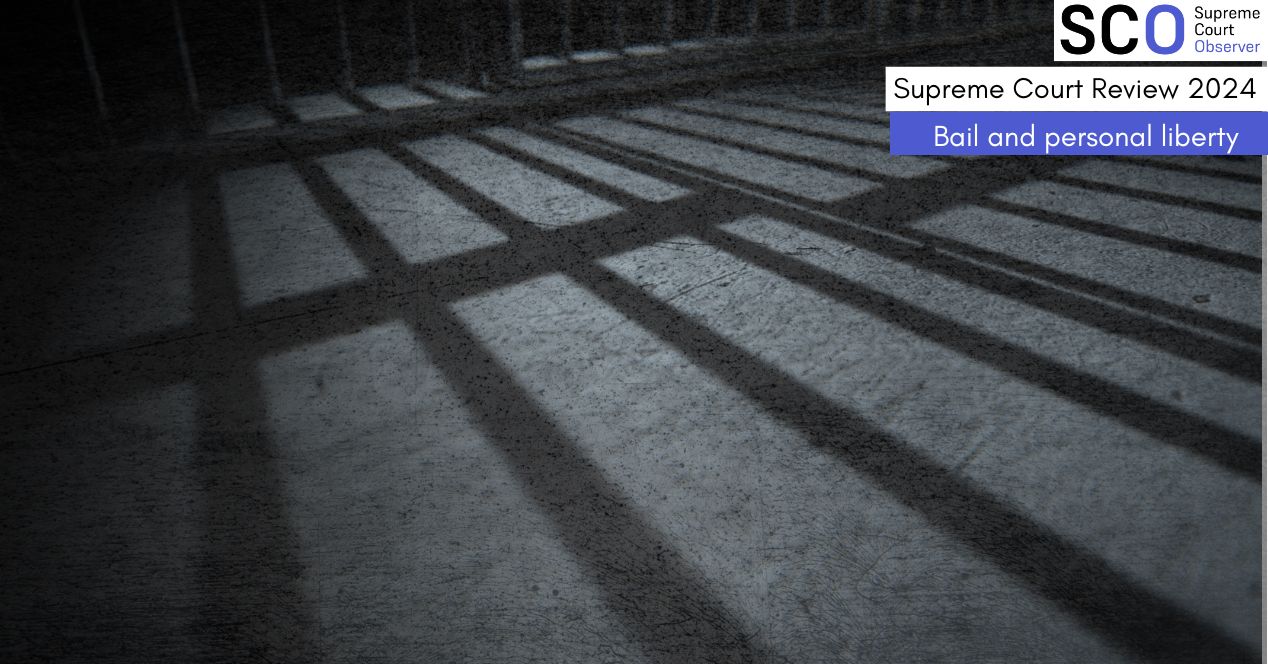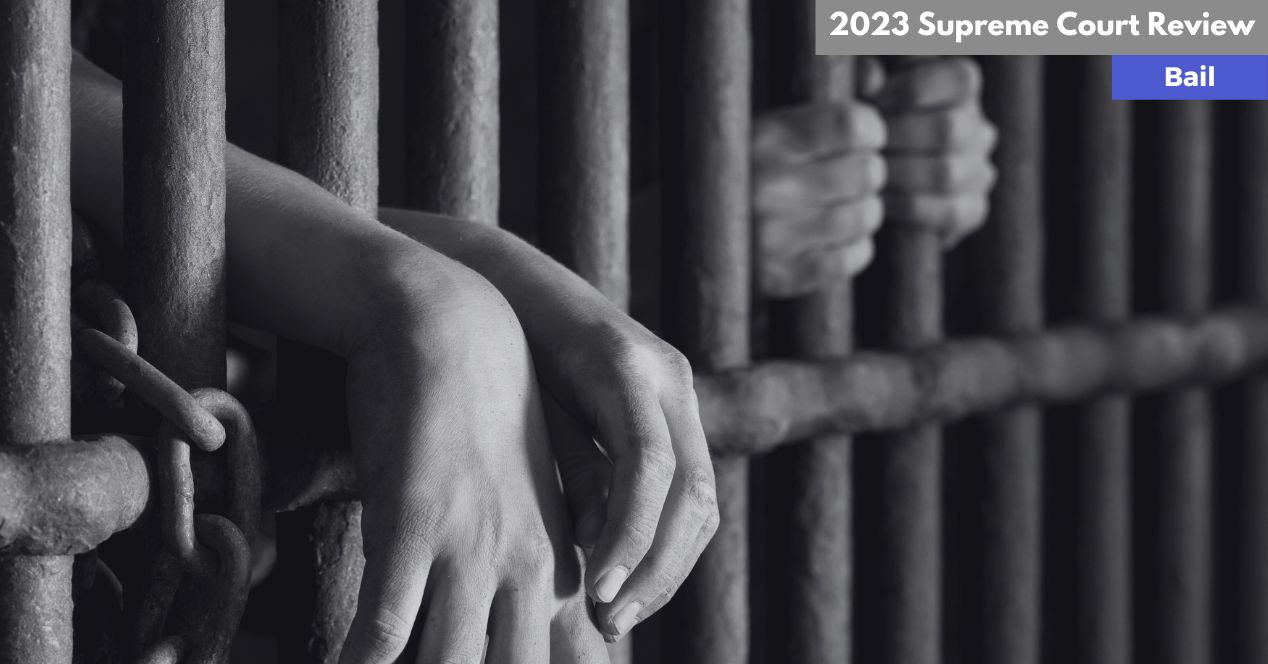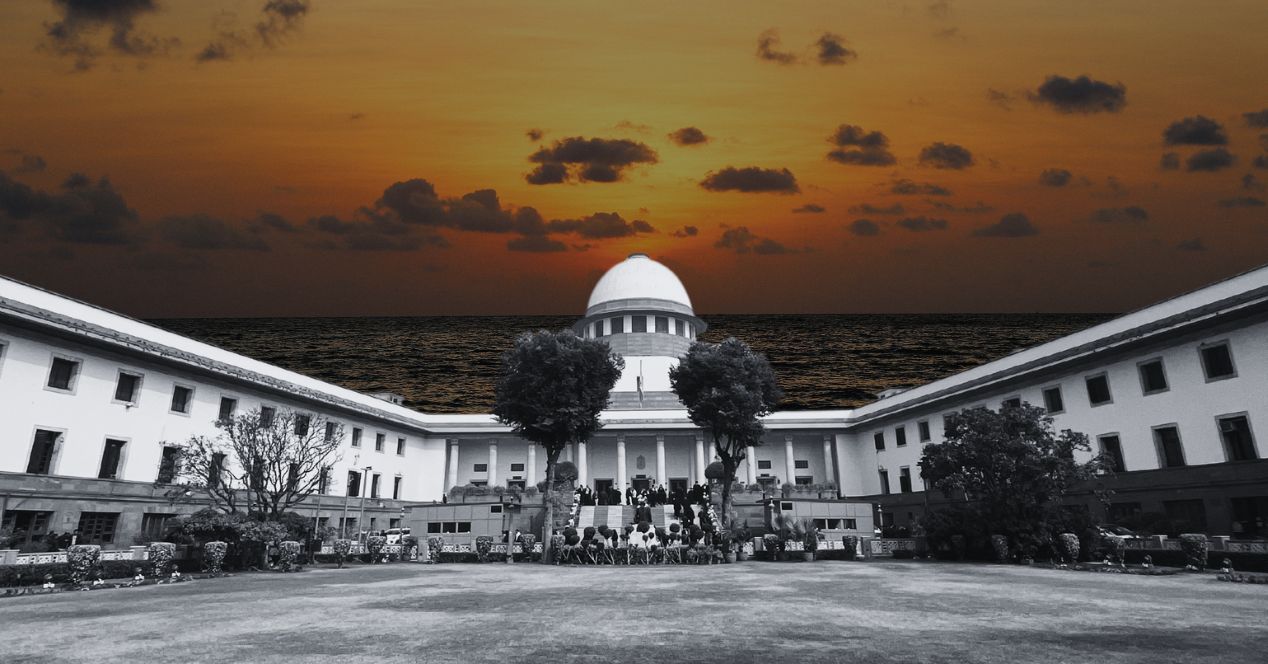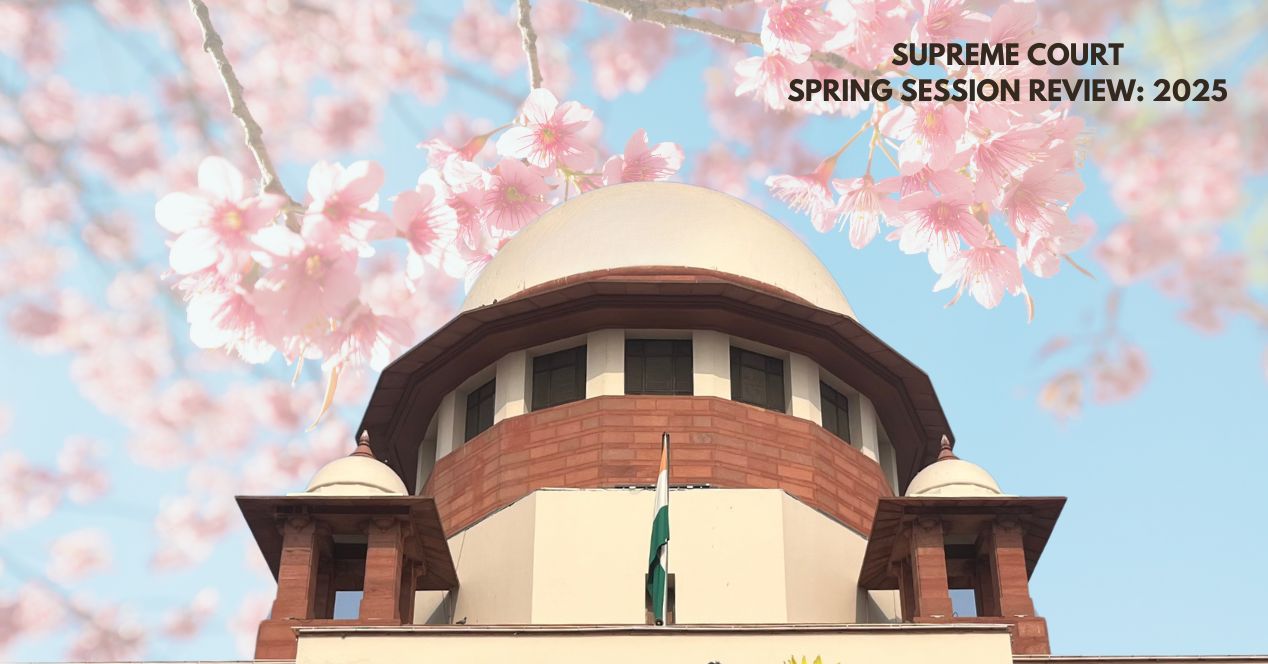Analysis
2025 Supreme Court Half-Yearly Review: Bail
The Court in the first half of 2025 displayed a patchwork of standards on bail and personal liberty
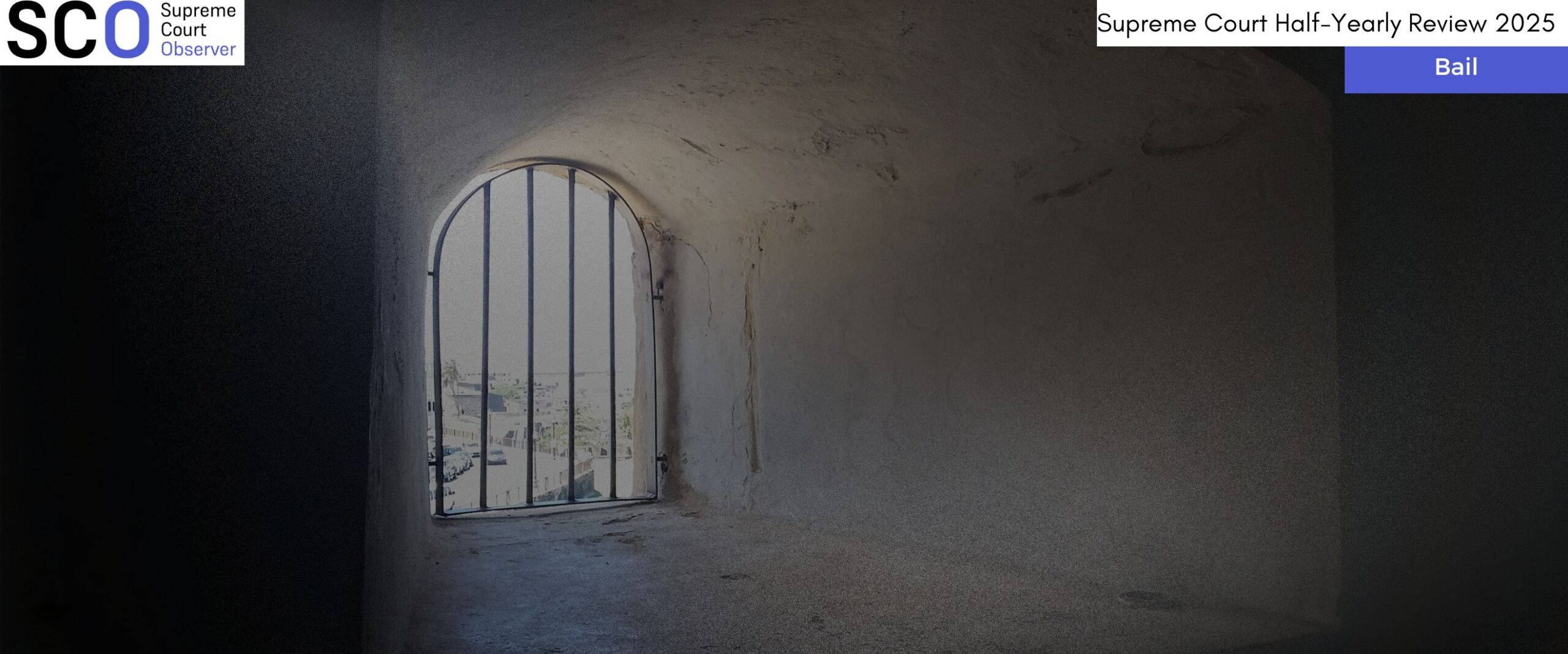
In the first half of 2025, two contrasting tendencies emerged in the Court’s treatment of cases on bail. On one hand, the Court intervened to correct problematic bail denials in cases of inter-faith marriage and took a calibrated approach to witness-tampering concerns in cases involving political figures like Senthil Balaji. On the other hand, it adopted a sharper insistence on accountability in economic offences, declaring a zero-tolerance approach to anticipatory bail in cases involving financial fraud.
What remains unchanged are the structural difficulties in obtaining bail under the Unlawful Activities (Prevention) Act, 1967 (UAPA). Procedural delays and reluctance to engage with merits continue to erode the promise of “bail as rule, jail as exception.” Even as the Court acknowledged the exceptional nature of preventive detention in Dhanya M v State of Kerala, the continuing delays in the bail hearing of Surendra Gadling, Jyoti Jagtap, and Hany Babu highlight the procedural deadlock that weighs on the liberty of prisoners.
From top politicians to interfaith marriages, this thread runs through key Supreme Court decisions from the first half of 2025, reflecting an uneven commitment to the protective framework of bail.
The case of interfaith marriages: anti-conversion laws vs personal liberty
In Aman Siddiqui v State of Uttarakhand, the Supreme Court considered whether omitting the groom’s religious lineage from a wedding invitation could attract prosecution under the Uttarakhand Freedom of Religion Act, 2018.
Aman Siddiqui, also known as Aman Chaudhary, was raised in a Kumaoni Hindu household by a Hindu mother and Muslim father. He married a Hindu woman in an arranged marriage with the knowledge and consent of both families. Objections arose from the bride’s distant relatives leading to Siddiqui’s arrest two days after his marriage. In a problematic ruling, the High Court denied bail, accepting the State’s allegation that omission of Siddiqui’s father’s name from the engagement card amounted to concealment of religion.
The Supreme Court set aside the High Court’s order. A bench of Justices B.V. Nagarathna and S.C. Sharma observed that the State could not object to the couple residing together as they had married with the consent of their parents. Noting that Siddiqui had already spent six months in judicial custody and that the chargesheet had been filed, the Bench directed the Trial Court to release Aman on bail.
On 25 June, in Aftab v State of Uttar Pradesh, a Partial Working Days Bench of the Supreme Court granted ₹5 lakh compensation to an accused who spent 28 days in prison after the Court had granted him bail.
Aftab, also born of inter-faith parents, was accused of attempting forceful conversion of a Hindu woman under the Uttar Pradesh Prohibition of Unlawful Conversion of Religion Act, 2021. His bail plea was rejected by the Allahabad High Court, but later granted by the Supreme Court on 29 April 2025. However, Aftab was released only on 24 June 2025.
The jail authorities withheld his release on the technical ground that a clause of the 2021 Act was not mentioned in the bail orders. When Aftab approached the Court to modify the order, a Bench of Justices K.V. Viswanathan and N.K. Singh rebuked prison authorities for delaying release on “hyper-technical and irrelevant” grounds, noting that the earlier order had already specified all key identifiers to establish the identity of the accused.
Aftab and Aman Siddiqui’s cases remain pending in the Trial Court. Meanwhile the batch of petitions challenging the constitutionality of anti-conversion laws stay pending before the Supreme Court.
A citizen on bail or a minister in jail?
Seven months after Dravida Munnetra Kazhagam (DMK) Minister Senthil Balaji was released on bail, the Supreme Court ruled on a petition seeking its cancellation in Senthil Balaji v The Deputy Director, Directorate of Enforcement. While the Court had previously criticised Balaji’s immediate reinstatement to the Tamil Nadu cabinet, it ultimately upheld the bail order.
Balaji is accused in a cash-for-jobs scam under the Prevention of Money Laundering Act, 2002. He was arrested by the Enforcement Directorate in June 2023, as part of a long list of Opposition leaders charged under the PMLA. He was granted bail after 15 months due to the delay in his trial.
The petition seeking the bail cancellation highlighted that Balaji’s position could deter witnesses from testifying. The bench gave Balaji a tough choice: stay a Minister and lose bail, or give up his post and keep bail. He chose the latter, resigning from his post on 27 April. The Court held that Balaji must not hold any public office during the pendency of the trial to avoid cancellation of his bail.
Interim bail for election campaigning
On 22 January in Mohd Tahir Hussain v State Of Nct Of Delhi, the Supreme Court delivered a split verdict on a petition by Tahir Hussain, a former Aam Aadmi Party councilor and an accused in the 2020 Delhi riots case, seeking interim bail to campaign in the Delhi assembly elections.
Hussain, who received a ticket from the All India Majlis-e-Ittehadul Muslimeen (AIMIM) while in custody, was granted custody parole by the Delhi High Court to file his nomination, but denied interim bail for canvassing.
On appeal, Justice Pankaj Mithal dismissed the plea, but Justice Ahsanuddin Amanullah allowed the petition, noting that he had completed five years of pretrial incarceration without any contact with the electorate. The matter was resolved by a three-judge Bench, which granted custody parole, permitting him to come out of jail for 12 hours every day from January 29 till February 3 to canvas for votes in the assembly elections.
Anticipatory bail in financial fraud cases
On 9 April, the Supreme Court held that anticipatory bail should not be granted to persons accused of serious economic fraud under the Companies Act, 2013. The Court was hearing Serious Fraud Investigation Office v Aditya Sarda. The Bench emphasised that pre-arrest bail is an exceptional power, not a matter of course, and observed that the accused failed to demonstrate a prima facie case of innocence.
The Court stressed that economic offences are of an especially heinous nature, committed with “cool calculation” and “deliberate design.” It held that evasion or hindrances to investigation disqualifies the accused from availing the “privilege” of anticipatory bail.
Preventive detention not an alternative to bail cancellation
On 6 June, the Supreme Court in Dhanya M v State of Kerala held that a detaining authority cannot resort to preventive detention if an accused violates bail conditions.
The ruling came in an appeal against a Kerala High Court judgment, which upheld a detention under the Kerala Anti-Social Activities (Prevention) Act, 2007. The detainee had violated the conditions of his bail, and the detaining authority alleged he was a threat to “public order”.
The Supreme Court disagreed. The judgement, authored by Justice Sanjay Karol, reiterated that preventive detention is an “exceptional” and “draconian” measure, to be exercised only in the rarest cases. The Bench noted that the detaining authority had not even sought bail cancellation, pointing out that extraordinary measures like preventive detention cannot be used as a shortcut where standard criminal procedure would suffice.
When procedure becomes punishment
The Court’s acknowledgement of preventive detention as an “extraordinary power” in one case does little to ease the prolonged procedural delays faced by the Bhima-Koregaon accused. The ongoing deferrals in bail proceedings continue to raise critical questions over rights of an accused under Article 21.
In February, the Supreme Court adjourned the bail pleas of advocate Surendra Gadling and activist Jyoti Jagtap. On 23 June, it refused to grant urgent listing for an application filed by former Delhi University Professor Hany Babu.
Gadling, arrested in 2018, continues to face delays in hearing, with repeated adjournments on grounds such as the police’s failure to produce substantial evidence and the prosecution’s withholding of documents in violation of Section 207 of the Code of Criminal Procedure. This year, his hearing was adjourned by the Supreme Court in February and postponed again in March.
Jagtap, in custody since 2020, has seen her bail plea adjourned four times by the Supreme Court across 2024 and 2025, after repeated rejections by the lower courts. Babu, arrested in July 2020, was denied bail by the NIA Court and the Bombay High Court. Though he approached the Supreme Court, he later withdrew his petition to return to the High Court. In May 2025, however, the High Court held it lacked jurisdiction in the absence of a clear permission from the Supreme Court to re-apply, pushing him back to square one.
All three are accused in the Elgar Parishad case and arrested under the UAPA. Their bail pleas remain suspended in a game of procedural ping-pong.
Raaz is an intern at the Supreme Court Observer.

